On a recent day in early March, construction crews were kicking off the second phase of the campus center renewal by starting to demolish the former entrance to the McGinley Center, the student hub that opened in 1959. Meanwhile, nearby, in a new four-story addition to that same McGinley Center, students were congregating in the student lounge—catching up, shooting pool, typing on their computers—and soaking in the soothing ambience.
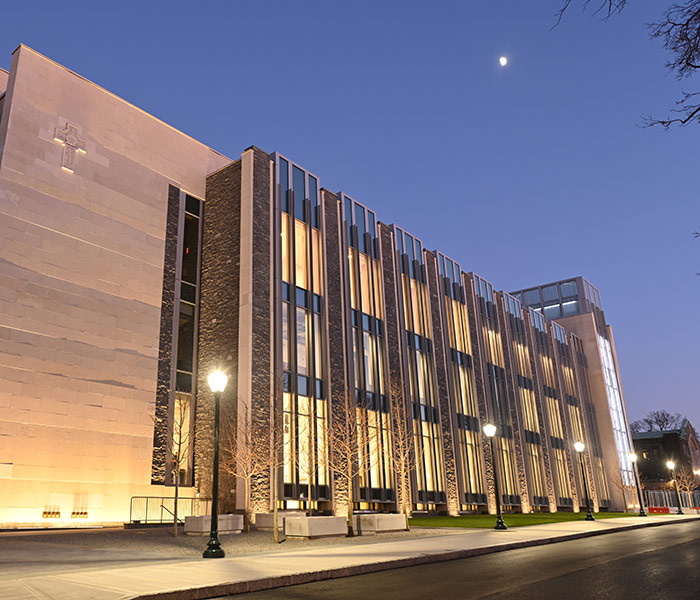
“It’s relaxing. I enjoy being here,” said Thomas Aiello, a junior who was getting some work done on his laptop. A student seated nearby, Kayla Bonitto, appreciated having the new gathering space after the physical isolation of taking virtual classes during the height of the pandemic. She and her friends had made plans to explore the new building together; on a recent night, students had gathered in the lounge for the State of the Union address and updates on the crisis in Ukraine. “It’s like a new sense of community,” she said.
That was the idea behind the campus center renewal, a keystone of the University’s $350 million fundraising campaign, Cura Personalis | For Every Fordham Student, which seeks to enhance all aspects of the student experience.
The new building addition will be combined with the Rose Hill Gym, Lombardi Center, and a renovated McGinley Center to form a larger complex that provides the entire University community with vastly greater space for offices, events, dining, fitness, and forming personal connections.
For some who have given in support of the project, it represents not just bricks and mortar but rather the continuous work of serving students and advancing the University from one era to the next.
Forging Ahead, Past the Pandemic
Kim B. Bepler, a Fordham trustee fellow and longtime University benefactor, recalled coming to campus for a lunch meeting during the first year of the pandemic, when the pivot to virtual learning had left the common areas of campus empty and quiet—except for the noise made by the builders.
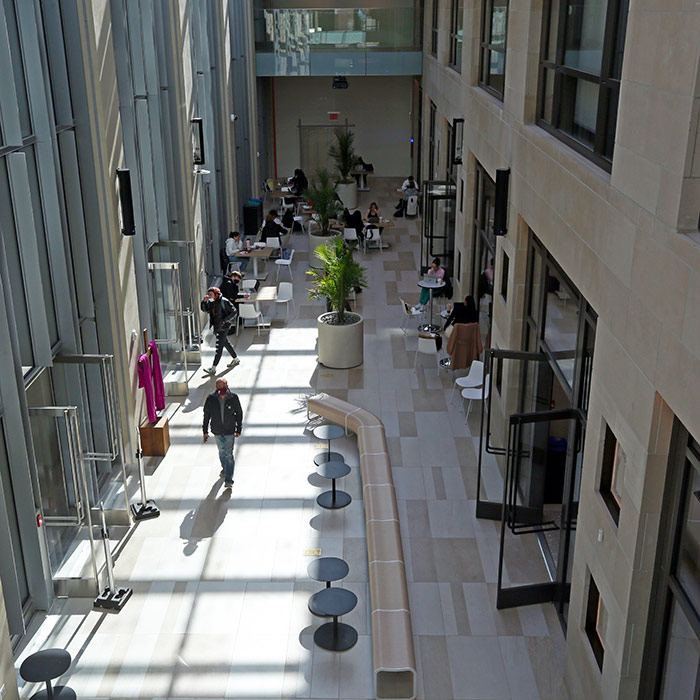
“It was rather poignant to be there when no one else was” and hear the project proceeding, she said. “At that moment, when we were all frightened, when we had no idea what was going on and when this was ever going to be over, that indicated to me that things would move on, life would continue somehow, some way,” she said.
She and her late husband, Steve Bepler, FCRH ’64, who passed away in 2016, have funded a wide array of needs at the University, including four endowed chairs in the STEM fields. It was appealing to support this project because the campus center will be named for Fordham’s president, Joseph M. McShane, S.J., and also because of its importance for fostering the informal exchange of ideas beyond the classroom, she said.
The project was important to Steve because of his own experience of student life at the University—“He loved his Fordham education,” she said.
“I just found that very encouraging and very heartwarming to be there during the pandemic and to listen to the sounds of construction and the sounds of the future,” she said.
‘Part of Being a Great University’
Trustee Emeritus Robert E. Campbell, GABELLI ’55, went to Fordham at a much different time, when the business school was housed in a surplus Army barracks building on the Rose Hill campus. “Many days, we would sit through class with our overcoats on,” he said. The McGinley Center wasn’t yet built, and because he was commuting from northern New Jersey, his mingling on campus was limited.
Even so, the social experience has stayed with him. “It put me in touch with so many new people,” he said. The Rose Hill campus “always was a place where wonderful people congregated.”
He went on to contribute to the physical transformation of the campus—as chair of the Board of Trustees from 1992 to 1998, he played a leadership role in the construction of the William D. Walsh Family Library, which opened in 1997. He and his wife, Joan M. Campbell, are generous University donors who were among those honored with the naming of the residence hall complex—comprising Campbell Hall and Salice and Conley Hall—that opened at Rose Hill in 2009.Now, they are giving in support of the campus center renovation and expansion.
“I don’t look at it as necessarily just a physical structure,” Campbell said. “It’s a home for people. People come to Fordham and leave their own homes [and]take up residence at a place. My feeling has always been that you would like to make that, physically, as supportive as possible.”
He noted that students’ experience of the new campus center could encourage them to give back to the University down the line.
“You always have to keep investing. It’s just part of being a great university, which Fordham is,” he said.
Communal Spaces
The new campus center offers state-of-the-art fitness equipment; glass walls and ceilings that allow for natural light; bigger and better spaces for the Career Center, Campus Ministry, and Center for Community Engaged Learning; new multipurpose rooms; and many other amenities.
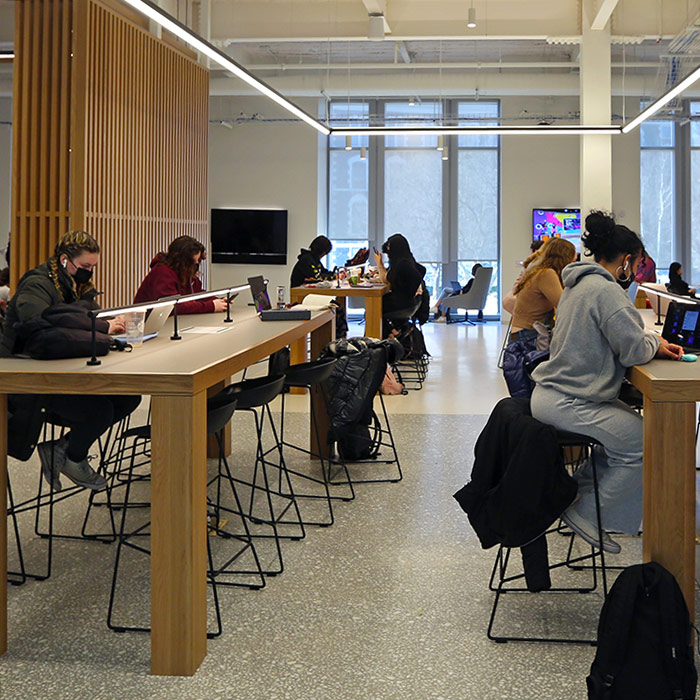
And more is yet to come—the phase-two demolition of the current McGinley Center entrance is clearing the way for an enclosed glass arcade from which students can access the Rose Hill Gym, the McGinley Center, the Lombardi Center, and the new building. That’s expected to be done by September 2023, said John Spaccarelli, director of facilities and special projects, who is overseeing the construction.
Phase three, to be done by the end of 2024, involves renovating the McGinley Center and reconfiguring some of its existing spaces, Spaccarelli said. He estimated that the entire campus center renewal is 35% to 40% complete.
In the student lounge, first-year student Jocelyn De Fex appreciated having the kind of inviting communal space that commuters like herself would otherwise have a hard time finding on campus. “If this didn’t exist, I would only be able to go to the library,” she said. She was hanging out and eating breakfast in the lounge with Kayla Bonitto, who appreciated the layout that makes the Career Center easier to find.
“When you get off the [second floor]elevator, it’s immediately right there,” said Bonitto, a junior.
A Place for Focusing
Nearby, Nick Chao, also a junior, said the lounge seemed to invite studying. “You kind of feel like when you come here, you can get work done,” he said. “I come here maybe a few times a week, maybe late at night, just to get some studying in.”
Conversation formed a gentle background hum. The 17-foot-high ceilings were treated with an acoustical spray that not only protects against fire but also dampens the sounds that would normally be bouncing around between the walls and the ceiling, Spaccarelli said.
Aiello, an organizer with the Herd, a student group supporting Fordham athletics, said the aesthetic appeal of the center will surely help with recruiting prospective students as well as student-athletes. The project shows Fordham’s commitment to updating its infrastructure, and “I think that’s huge for [the University],” he said.
To inquire about giving in support of the campus center renewal or another area of the University, please contact Michael Boyd, senior associate vice president for development and university relations, at 212-636-6525 or [email protected]. Learn more about Cura Personalis | For Every Fordham Student, our campaign to reinvest in every aspect of the Fordham student experience.
]]>
Here, in a poorly lit first-floor food court on Mott Street, members and guests of the Asian American and Pacific Islander Alumni at Fordham Affinity Chapter turn their heads, suddenly, when the ruckus rambles through the door. Chinatown’s lions have arrived to let the Fordham Rams know about the Year of the Tiger.
Across two large tables, this sprawling, multigenerational group is united by some shared heritage and a lot of shared history: Their families came from China, Korea, and Burma, and now they’ve brought their own spouses and children to dine over char siu bao, congee, rice noodles with dried shrimp, sesame balls with red bean paste, fry bread, and kimchi. Tea tops the table all over: some steaming, some iced with boba bubbles.
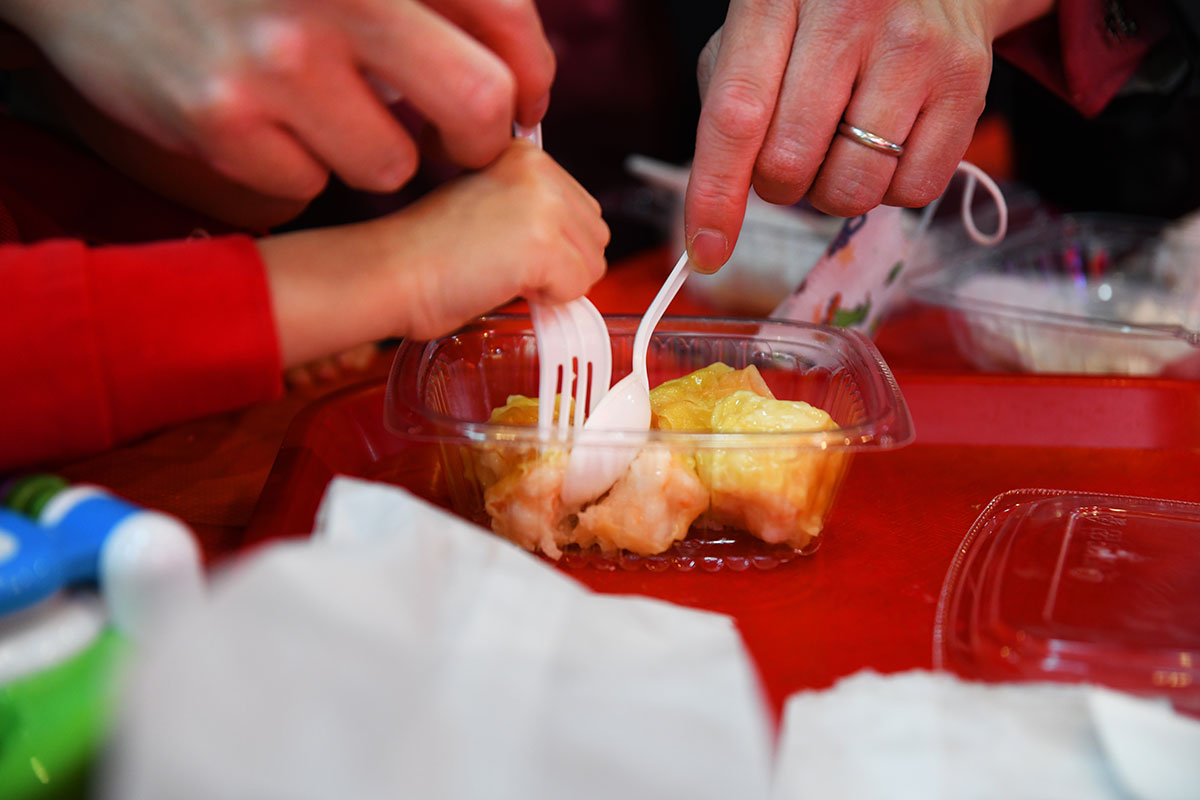 Everyone here has some connection to Fordham University. Sure, the school was founded in 1841 primarily for Irish, Catholic immigrants by an Irish immigrant who became the first archbishop of New York, but today it’s everybody. “Is it not delightful,” Confucius asked more than two millennia ago, “to have friends coming from distant quarters?” Some are alumni, some are current students; one man, a Navy lifer, is here just because his two kids went to Fordham and he’s proud about it.
Everyone here has some connection to Fordham University. Sure, the school was founded in 1841 primarily for Irish, Catholic immigrants by an Irish immigrant who became the first archbishop of New York, but today it’s everybody. “Is it not delightful,” Confucius asked more than two millennia ago, “to have friends coming from distant quarters?” Some are alumni, some are current students; one man, a Navy lifer, is here just because his two kids went to Fordham and he’s proud about it.
The group formed just a year ago, but that’s not surprising: The pandemic period has been particularly turbulent for Asian Americans, with sporadic incidents of anti-Asian aggression growing more and more frequent. The FBI estimates a 73% increase in such events across the country in 2020, with many of them occurring in New York City. This has led to waves of protest and acts of solidarity amid concerns about how anti-Asian bias is affecting young people in particular.
“I got involved last year,” says Mark Son, a 2010 Fordham Law graduate and one of three co-leaders of the group, which was founded by the Hon. Christopher P. Lee, FCRH ’71, LAW ’79. “I was worried about the anti-Asian-American hate crime. I think it was very important to do this sort of work, trying to keep a voice present in the conversation.”
Son, a principal law clerk with the New York State Supreme Court in the Bronx, views the community and its foundation as a building block to social justice, growth, and learning. “Students had expressed concern,” he adds, “and we wanted alumni to create a network. Even within the Asian American community, we have different subsets: Chinese, Koreans—Kyaw,” he points to Fordham senior Kyaw Hein, eating pork dumplings and listening in on the conversation—“is from Burma. We have a guy from Tonga. So it’s a learning experience for us, as well.”
Edwin Wong, another co-leader of the group, notes how much things have changed from the time he earned an M.B.A. at Fordham’s Gabelli School of Business. “In 2004, it was getting there,” he says of the University’s growing Asian American population, “and now we’ve got lots of Koreans, Chinese, Filipinos, and South Asians—a distribution list of more than a thousand people. Before, people took it for granted, but now people are getting engaged with the community.”
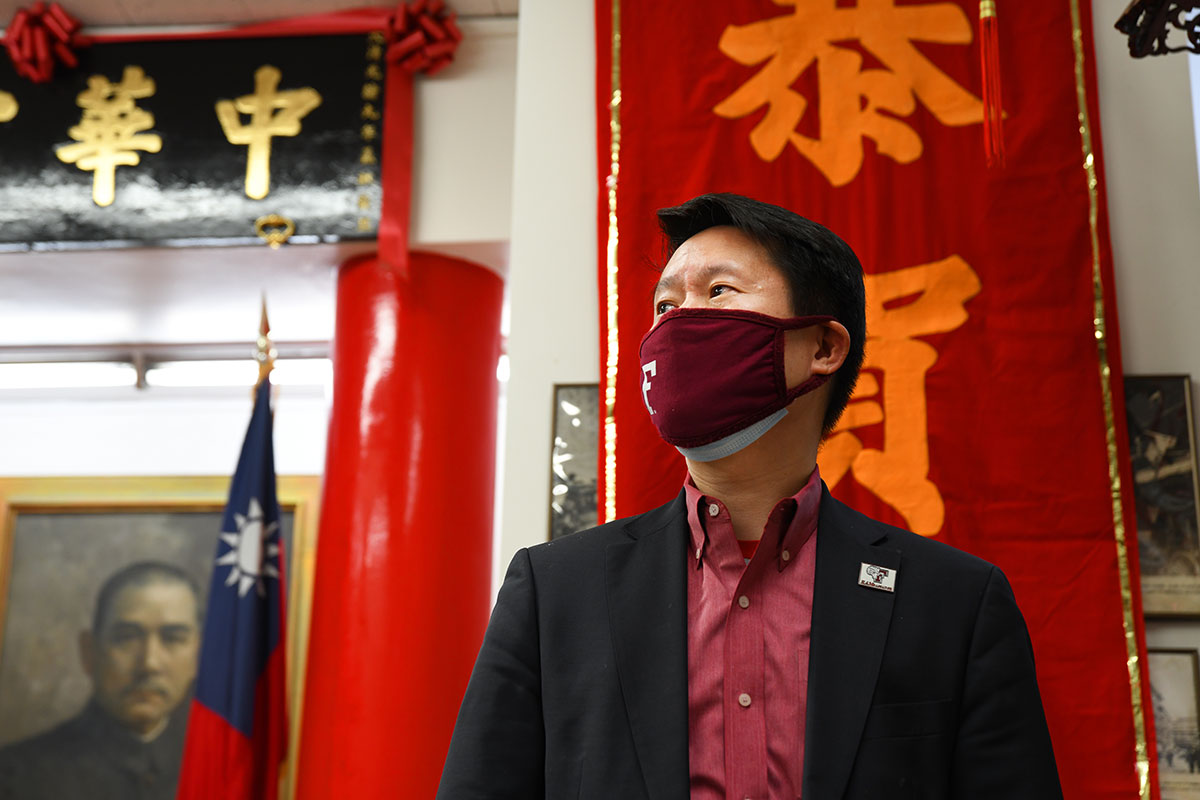
While at Fordham, Wong says he started what he calls the Fordham Asian Business Network for students and alumni eager to draw on the collective strength of a growing community in a shrinking world. “You need a network, so I started that,” he says, noting that he and many of the alumni in the group would love to see Fordham launch an Asian American studies program that would grow to become as prominent as the University’s departments of African and African American and Latin American and Latino studies, which have their roots in the late 1960s. (This work is already underway: With support from two University grants—an Arts & Sciences Deans’ Challenge Grant and a Teaching Race Across the Curriculum Grant from the chief diversity officer—a group of 10 Fordham professors is developing a curriculum for a minor in Asian American studies.) Son says that he looks forward to seeing “a community that’s more welcoming,” with more Asian Americans teaching as professors and in leadership positions.
With their small children bedecked in maroon college apparel, some toddling if they’re able to walk at all, the alumni say they plan to return to the neighborhood in just a week, when the largest new year celebrations will kick off. “My hope is that in the future,” says Wong, “we could have a Fordham group march in the larger Manhattan Lunar New Year parade, the same way that Fordham participates in the annual St. Patrick’s Day Parade.”
After lunch, they all move through streets chockablock with onlookers and revelers wearing masks, playing games, throwing small fireworks against the sidewalk, and shooting off confetti poppers. The group rambles through the narrow lanes, lingering on Bayard Street, home to many iconic businesses such as the Mei Lai Wah Bakery and the Chinatown Ice Cream Factory. At the Chinese Consolidated Benevolent Association, President Justin Yu welcomes the group, offering them—you guessed it—more food. They talk about both Fordham and their community’s future in a changing world for Asian Americans while nibbling on sweet sponge cake.
It’s not hard to see, as parents unwrap snacks for their littlest, who they have in mind. After all, it’s a new year.

Learn more about the Asian American and Pacific Islander Alumni at Fordham Affinity Chapter on the group’s web page and its Facebook and Instagram accounts.
]]>“I didn’t know what I wanted to be,” he says. “The only thing I knew was that I wanted the opportunity to study film in New York.”
Luciano ultimately chose Fordham because of the support that the School of Professional and Continuing Studies offered him, including the opportunity to work full time while taking some core classes in Spanish, with other classes geared specifically toward English language learners. “It helped me transition before getting into my major classes,” the 2002 graduate says.
He soon landed a position at the Spanish-language TV network Univision, where he moved from an internship into a full-time marketing position while continuing to pursue a degree in communications and media studies.
Though he initially thought he wanted to be a producer, his experiences both at work and in class led him on a different path. “I decided that if I wanted to be the head of a team and have power to make decisions, that was really on the advertising side,” he says. “I was afraid of losing my creative side at first, but my professors who worked in the business opened my eyes and showed me how I could still be creative this way.”
Now a vice president of sales at another Spanish-language network, Azteca América, Luciano credits Fordham with helping him find professional success—especially through collaborative experiences.
“You rarely do anything on your own in my job; there are usually two or three departments you have to collaborate with. That was the way Fordham worked too.”
His Fordham experience made an impact on his personal life too. One of his film classes established his personal tradition of Saturday morning movie outings. “I loved going to class on a Saturday morning and watching a whole movie, so I still do it,” Luciano says. “At about 10 in the morning on Saturdays or Sundays, that’s how I usually go to the movies, sometimes with another friend who was in that class.”
Luciano has also found time to produce two films so far—a feature film about María Montez, the Dominican-born actress who was known as the Queen of Technicolor, and a children’s movie about baseball. Now he’s working on writing a romantic comedy with Volney Guzman, PCS ’02, a fellow Dominican he met on the bus from Fordham’s Rose Hill campus to Manhattan.
His relationship with the University has lasted as well. He has come back to campus to speak to students in several classes, and he currently chairs MOSAIC, the alumni affinity chapter that aims to support diversity and inclusion in the Fordham community. The group is co-sponsoring the upcoming panel on How to Succeed as a Diverse Candidate, which will take place on the Lincoln Center campus on Feb. 19. And they’re preparing for a half-day diversity and inclusion conference at Rose Hill in April.
It’s a topic Luciano is passionate about, and it’s one of the reasons he got involved with MOSAIC in the first place.
“I always wanted to do something like this that can help connect the community at large to Fordham and also help students who are in the same situation as me,” Luciano explains. “Sometimes we limit ourselves as minorities, because we think we aren’t going to be successful. And a lot of minority students also don’t have access to a network of people that can help them out,” he says.
“You have to find your way to being comfortable with being diverse, knowing you have something different to offer. And we have to help start that network for each other.”
Fordham Five
What are you most passionate about?
Traveling. In the last 10 years, as it has become easier to travel, I realized how big the world is, but also how small at the same time. You go explore different places, different cultures, and different people, and you see the commonality of the human race.
What’s the best piece of advice you’ve ever received?
One of my bosses once told me not to be ashamed of my accent. When I told him I was uncomfortable when I have to present, he said that everybody speaks with an accent, and that anybody who has spoken with me will notice that I am not only educated and smart, but I am also bilingual. It made me pull back and see what I have to offer, to get comfortable with the idea that yeah, I’m a minority, but that’s my strength, not my weakness.
What’s your favorite place in New York City? In the world?
I love uptown Manhattan, especially Washington Heights. I have seen this area change through the years. I used to visit as a kid and I hang out there on weekends now. There are so many good places, and it’s definitely been gentrified, but I think these newcomers go there because they appreciate the whole mix of people. That’s what they want to see. So I enjoy how diverse and popular it is now. It also still feels like an extension of my country, the Dominican Republic.
Name a book that has had a lasting influence on you.
Jonathan Livingston Seagull by Richard Bach. I first read it around the time I moved here, when I was about 18. But I don’t remember how I found it. I found it again at one of those book fairs where they sell books for a dollar about 10 or 15 years later, and I loved it even more. Probably because I grasped the meaning more. It’s this idea of discovering our potential, that the sky is the limit, that we can all be so much more if we just believe in ourselves. And that you shouldn’t be tied to the group; you should challenge yourself.
Who is the Fordham grad or professor you admire most?
Juan R. Avila, Ph.D., a math professor who used to run the bilingual program at PCS that I was in. His passion to help the Latin community by creating and running this program helped a lot of immigrants like me have access to a high-quality education. Without his initiative, I don’t think many of us would have had the chance to get a degree from a prestigious school like Fordham.
]]>